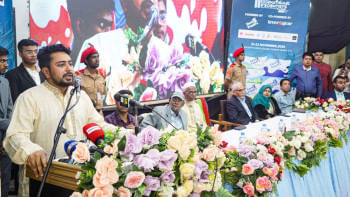Chronicles of the Rebel Poet

Kazi Nazrul Islam, one of the greatest artistic polymaths of the subcontinent, had a life as diverse and happening as his works were. From being the muezzin at a mosque to a soldier to a masterful writer-editor-composer-political voice and in his last decades spent in dreadful physical and mental conditions, the course of his life is utterly fascinating. And yet, until now there was no audiovisual documentation of his life in the country where he is the National Poet. Nazrul Institute with assistance from the Cultural Affairs Ministry yesterday launched the DVD of “Nazrul: Jibon Parikrama”, a full-fledged documentary on Kazi Nazrul Islam, in a programme at the Sufia Kamal Auditorium of the Bangladesh National Museum (BNM).
The documentary, acquired from reputed Indian documentary filmmaker Mujibar Rahman who only completed making it recently, chronicles Nazrul's philosophy and works at various stages of his life.
Cultural Affairs Minister Asaduzzaman Noor was the chief guest at the programme, while eminent Nazrul researcher Professor Emeritus Dr. Rafiqul Islam was the special guest. Other speakers at the event were Nazrul Institute's Executive Director Abdur Razzaq Bhuiyan and BNM Director General Faizul Latif Chowdhury. Rezauddin Stalin, Deputy Director of Nazrul Institute, anchored the programme.
Dr. Rafiqul Islam informed that a documentary on Nazrul was made in pre-independent Bangladesh by the Pakistan government, but it was not a good one. UK's Channel 4 also made a documentary later on Bangladesh's National Poet, but that was aimed more at an international audience, which makes this the first full-length documentary for the Bangladeshi audience.
Asaduzzaman Noor in his address said Nazrul's life and works are so diverse that it is difficult to encompass it all in one documentary, and the ministry will provide support to anyone trying to make more documentaries on the National Poet. He also outlined the government's plans to establish branches of Nazrul Institute in Comilla, Chittagong and other places that bear memories of Nazrul, to facilitate practice of Nazrul's works there.
The documentary has three versions according to organisers: one of them is 120 minutes, one is 80 minutes and the other is rather brief. The 80-minute version was also screened at the event.
Mujibar Rahman does a commendable job of putting all the aspects of Nazrul's work in chronological form, despite not having any archival video footage of the National Poet. He uses narration, interviews with eminent Nazrul researchers and musicians, musical pieces, reading of excerpts from other writers' works about Nazrul and some filmed scenes to establish the story. Nazrul's world-view, philosophies, cultural and literary influences and close connection to Rabindranath Tagore are all documented in a comprehensible, coherent timeline. It is not the most engaging or polished documentary one has ever seen, but certainly is one that does the job.


 For all latest news, follow The Daily Star's Google News channel.
For all latest news, follow The Daily Star's Google News channel. 



Comments